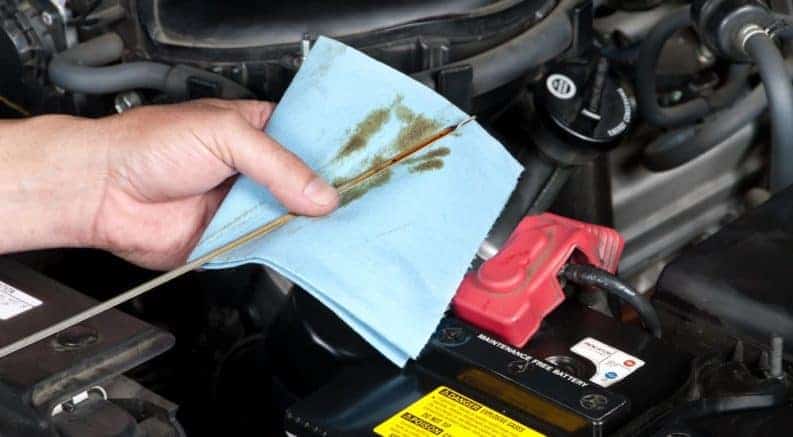For many, car maintenance can be overwhelming. This is usually attributed to many car owners’ lack of knowledge when it comes to these generally complicated subjects. At the end of the day, can many people really explain the inner workings of their car? In other words, if this is you, you shouldn’t feel bad about asking questions. After all, how else would you learn? Well, there’s one basic maintenance that shouldn’t be stressing you out: getting an oil change. Primarily, this bit of maintenance is easy to complete and shouldn’t break the bank. Of course, we’re assuming you’re going to be visiting a mechanic to complete the change. However, there’s still plenty of knowledge to be had before you actually head into that business.
Below, we’ve explored some common questions as they pertain to oil changes. Hopefully, when you’re finished reading these various inquiries, you’ll feel a whole lot better about your upcoming experience.
When should I change my oil?
You may feel like we’re cheating a bit with this answer, but it’s sincerely the best route: check your car’s manual. The oil change schedule for each car is different, and it’s important to zero in on a date that works for your specific ride. If you fail to follow these specific guides, you may find yourself hurting your car’s mechanics.
In other words, you shouldn’t be relying on your experiences with former vehicles, and you might also want to be wary of a mechanic’s advice (after all, their main intent is to make money). Rather, if you want to be safe, opt for whatever’s listed in your user manual.
“Your owner’s manual has more detailed information about your car than any mechanic does,” the chief mechanic for Consumer Reports, John Ibbotson, told ConsumerReports.org. “Don’t get talked into too-often oil changes. Follow the manual and your car’s engine should stay well-lubricated and perform well.”
Fortunately, many vehicles are often accompanied by some type of service reminders. These could be seen directly on the dashboard (you might already be familiar with the accompanying light), or you might also be notified via a smartphone application. These warnings can also be treated as gospel, and you should be visiting a mechanic as soon as you receive one of these alerts.
What if my car doesn’t provide those alerts? And what if I lost the manual?
If your vehicle doesn’t provide these service warnings and the car didn’t come with a manual (this is a distinct possibility if you’ve purchased a used vehicle), then you should be constantly monitoring your car’s oil levels. Even newer vehicles occasionally need a bit of a refill before their scheduled oil changes, so these personal tests could be valuable in any scenario.
Generally, experts suggest checking your oil at least once a month. If you’re noticing any major signs of a leak, then you should get your vehicle into a mechanic as soon as possible. Besides the levels, you’ll also want to keep an eye on the oil’s color and consistency; if it’s light and goopy, this is a major sign that coolant has made its way into the system. Furthermore, if there are any shiny particles floating in the liquid, that could be a sign of engine failure. Generally, your oil should be black or brown, and any other color, shade, or hue basically indicates a need for an oil change.
What about that “every 3,000-miles” rule?
Back in the day, having your oil changed every 3,000 miles was the general rule of thumb (others insisted on the “every three months” rule). However, considering the advances in technology over the years, this mindset has proven to be a bit outdated. Nowadays, many vehicles require annual or biannual oil changes, and drivers may also be asked to check up on their levels every 10,000 or so miles. In other words, while the previous mindset required you to check every few months, you really only have to check a few times a year.
Of course, speaking of these mileage markers, that doesn’t mean you won’t need an oil change if you rarely use the car. Rather, the oil still needs to be replaced, and you could compromise the mechanical aspects of your rarely-used vehicle if you fail to do so. This is because of the moisture which will form due to inactivity, and this moisture could end up destroying your engine.
Do I need synthetic oil?
Probably not. Unless your vehicle specifically calls for synthetic oil, you could just stay clear. This should be especially welcome news to your wallet, as synthetic oil can cost up to four times more than its regular counterpart. Oil brands tout that their synthetic offering is better at resisting breakdowns, and it can also tolerate much higher temperatures. Ultimately, this should only be a concern for few car engines, so just make sure you refer to your car manual before making a decision.
So what oil should you actually be opting for? Well, this isn’t always easy to determine. Your vehicle should specifically state somewhere on the engine which oil option is the best choice, and you can research online to see which brand you should be opting for.
“Make sure you know what’s recommended or required by your automaker before you visit your mechanic so that you can control the cost of the oil they’re putting in,” Ibbotson said.
How much should an oil change ultimately cost?
Generally, assuming your vehicle isn’t equipped with any unconventional motor, an oil change should only set you back around $20 to $30. If you require a synthetic oil change, you can essentially expect a higher price tag. These prices will vary mechanic to mechanic.
Of course, some of the service centers will try to offer you additional services. These offerings could range from mechanical revisions to carpet vacuuming (which, if you couldn’t tell, probably isn’t worth the extra charge). It’s in your best interest to explore the benefits of these repairs and additions before committing to a purchase.
Generally, if you trust the dealership, you should also be trusting their judgment. If they’re suggesting some additional repair, it’s probably in your best interest to follow through.
Can I change my own oil?
Sure, but it’s really not worth the time nor effort. There are plenty of online guides that will hold your hand throughout the entire process.
Predictably, this will literally turn into a messy affair, as you’ll probably be walking away from the process completely covered in oil. Furthermore, there’s a chance you could make a mistake, and this could end up compromising the entire engine. While your original intent was to save a few bucks, you might need to end up spending an extra thousand on repairs. Was it really worth the hassle?
Instead, you should be relying on a trustworthy mechanic or dealership to handle the oil change. These experts specialize in these types of services, assuring that you can drive away without any issues (or messy clothes).
So there you have it! Getting an oil change is nothing to stress out over, and it generally shouldn’t break the bank (unless you decide to complete them yourself). Just continue referring to our helpful guide throughout the process, and we’re sure you’ll come out of the ordeal unscathed.





